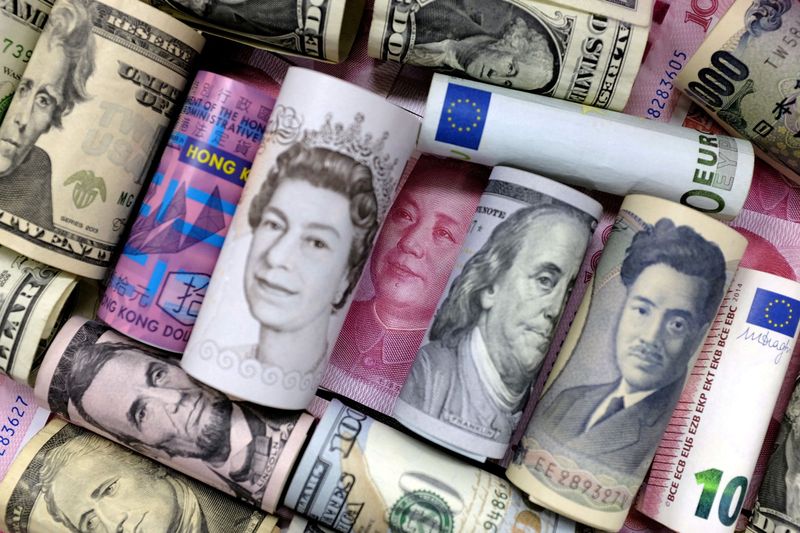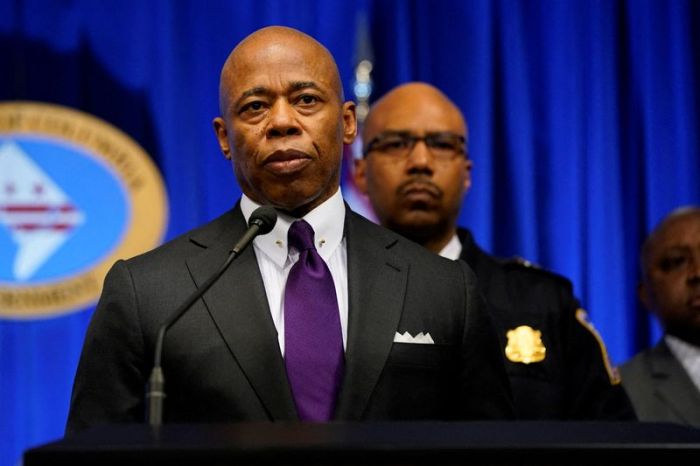NEW YORK (Reuters) – The dollar rose for the fourth time in the past five sessions, as economic data on the labor market helped firm expectations the U.S. Federal Reserve will be more aggressive in taking steps to curb inflation.
Weekly initial jobless claims fell to a seasonally adjusted 187,000 last week, the lowest level since September 1969 and below the 212,000 forecast.
While new durable goods orders unexpectedly fell in February as shipments slowed, demand for goods remained strong. In addition a measure of business activity for March climbed to an eight-month high.
The data and recent comments from Federal Reserve officials have strengthened views the central bank will hike rates by more than 25 basis points at its next policy meeting in May. Expectations for a hike of 50 basis points at that meeting are 70.5%, according to CME’s FedWatch Tool https://www.cmegroup.com/trading/interest-rates/countdown-to-fomc.html?redirect=/trading/interest-rates/fed-funds.html, up from 32.9% a week ago.
“The dollar continues to be like a steamroller here, pretty much running over anyone that takes a short position against it,” said Karl Schamotta, chief market strategist at Cambridge Global Payments in Toronto.
“The data we are seeing certainly supports the case for multiple 50-basis-point hikes this year, and that is pushing up the front end of the curve and leading the dollar to outperformance against virtually every major as well as the commodity-linked currencies, which is something of a surprise.”
Federal Reserve Chair Jerome Powell recently raised the possibility of raising interest rates by more than 25 basis points at upcoming meetings, a more aggressive stance echoed by other policymakers as they attempt to cool rising inflation, which has supported the greenback of late.
On Thursday, Chicago Fed President Charles Evans said he would be comfortable raising rates at every Fed meeting through next March by 25 basis points each time but is “open-minded” about a possible 50-basis-point hike.
Fed Governor Christopher Waller said the state of the U.S. housing market should help shape monetary policy and there seems to be no cooling in sight for higher home costs, although Minneapolis Federal Reserve Bank President Neel Kashkari on Thursday said he has penciled in seven quarter-point interest rate hikes this year and warned against overdoing it.
Morgan Stanley’s chief U.S. economist Ellen Zentner on Thursday said the firm now sees 50-basis point hikes at both the Fed’s May and June meetings, with 25-basis-point hikes at each meeting after through the rest of the year.
The dollar index rose 0.163%, with the euro down 0.06% to $1.0997.
Euro zone business growth was stronger than expected this month, a survey showed on Thursday, although prices rose at a record pace, likely adding to pressure on the European Central Bank to raise rates.
The Japanese yen fell against the U.S. dollar for the fifth session in a row, hitting its lowest since December 2015 at 122.40 with the Bank of Japan expected keep its soft monetary policy in place, in contrast to most other central banks around the globe.
The Japanese yen last weakened 0.92% versus the greenback to 122.27 per dollar, while Britain’s pound was last trading at $1.318, down 0.17% on the day.
The war in Ukraine has served to push up prices of oil and other commodities, adding pressure to already rising inflation.
Western leaders meeting in Brussels on Thursday agreed to strengthen their forces in Eastern Europe, increase military aid to Ukraine and tighten their sanctions on Russia.
Against the Swiss franc, the greenback rose 0.04%, after the Swiss National Bank held its policy rate at -0.75%, going against the grain of other central banks which have started hiking rates to combat inflation.
Norway’s central bank raised its benchmark interest rate on Thursday as expected, and said it now planned to hike at a faster pace than previously intended.
Against the Norwegian crown, the greenback rose 0.03%.
In cryptocurrencies, Bitcoin last rose 3.85% to $44,006.48.
(Reporting by Chuck Mikolajczak; editing by Jonathan Oatis)























